Clementine is the most beloved of the nursing home hens. So, when I got a call from Life Care telling me that she wasn’t looking well, I hurried over.
When I arrived late in the afternoon, Clementine was in an upright “penguin stance.” She was incapable of walking up the ramp and putting herself to bed. It was obvious that she was in distress. When a hen stands like that, she has something very, very wrong going on inside of her. I put her in a dog crate and brought her home. I set Clem down in my dark and warm laundry room. I didn’t fuss with her. Honestly, I thought that she was a goner. Usually, with a hen this ill, it is not a kindness to extend her life. I hoped that Clementine would pass peacefully overnight.
But the next morning, despite her extreme posture, Clementine was alive!
She was so upright that she was balancing using her tail feathers. I palpated her abdomen. As I expected, I could feel a large mass. Without actually looking inside (via autopsy after death) I couldn’t be 100% certain, – but I suspected that Clem was an internal layer, and that eggs had been dropping into her abdominal cavity, where they solidified. (Sometimes they remain liquid and become infected, but that feels like a water balloon, and Clem’s abdomen was hard.) I’ve have found such masses, doing autopsies, and know that the birds had lived with the solidified eggs for months if not years. Then again, Clem’s mass could be cancer. That I can’t treat, but if it was internal laying she had a slight chance of survival. This hen was very special to some special people. I set to it.
I laced her water with Duramycin, an antibiotic approved for poultry. If a hen is too weak to eat or drink on her own, I do not feed with a dropper. Not eating or drinking is a sure sign that the bird be allowed to die. Clementine showed that there was still life in her. She drank.
Sometimes hens take on that penguin stance because they have a diseased or blocked intestinal tract. They won’t (and shouldn’t) eat, and they can’t produce manure. Clem, however, was pooping. Another good sign was that there were bits of solids in the manure, and it wasn’t bright green or yellow (those colors indicate an active infection.)
Clementine’s keel bone stuck out sharply, which is another sign of an ill hen that hasn’t been eating or digesting food properly. I fed her scrambled egg and gave her rolled oats for treats. She ate with the appetite of a healthy hen. She was particularly delighted with spaghetti coated with olive oil.
Next, I gave Clementine a long, warm soak in epsom salts. If there were any impacted eggs in her reproductive tract, this would help to move them out. Epsom salts are also a revitalizing tonic. She didn’t excrete lash, but she did like the spa treatment.
Clem also liked the blow dry. She waddled up and sat on my lap. I believe that one reason that she was reviving was because this is a friendly hen. That’s why she is such a good therapy hen. Clem is calm and trusting.
Still, she was a very sick bird.
I don’t usually bring sick hens inside for any length of time. However, Clementine wasn’t part of my flock, and she was ill, so I didn’t want her in my coop. Also, temperatures were well below freezing. Not only did she need to be warm, but I didn’t want to go outside numerous times during the day! She stayed in my laundry room.
Over the next few days, I continued to give Clementine antibiotics in her water. I kept her calm. I monitored her manure production and food consumption – both improved, as did her stance.
Each day saw an improvement.
I trimmed off her tail feathers ruined by her penguin stance, but she no longer needed them to balance! Clementine was now walking in a more chicken-like way. She was able to peck. She started scratching the ground. She was even able to preen.
But, a hen kept indoors, and one that has been too weak to dust bathe does see an increase in the numbers of poultry lice crawling on her. She needed a dusting with louse powder.
It is not good to keep an ill, listless hen alive. One that can’t do normal chicken behavior, or eventually live in the coop as a full member of the flock, should not be kept going. I observed Clementine carefully. This was a hen on the rebound. I had never before been able to bring a hen back from such a severe case of (what I believe is) internal laying. Clementine continued to earn her stripes as a very special chicken, indeed.
I picked her up from the nursing home on a Thursday night, and a week later, on a Friday, I returned her to the flock. More about that in the next post.
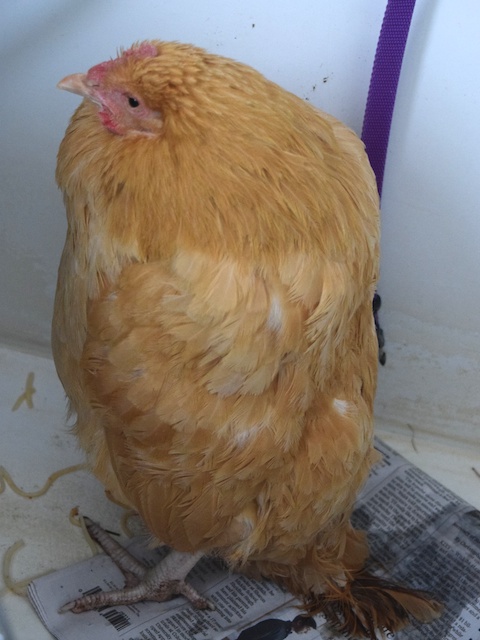
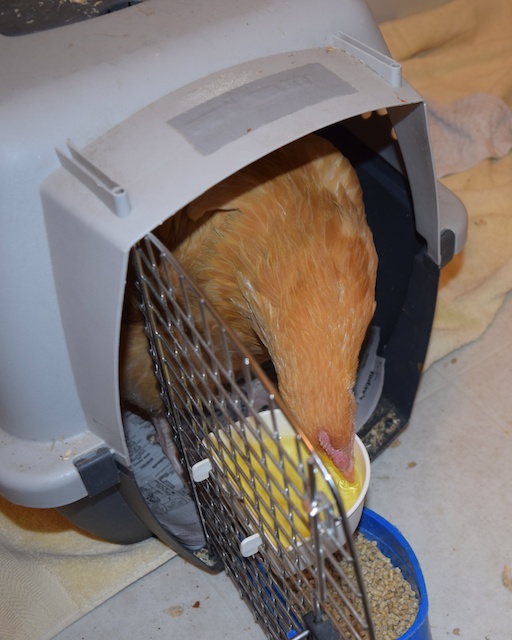
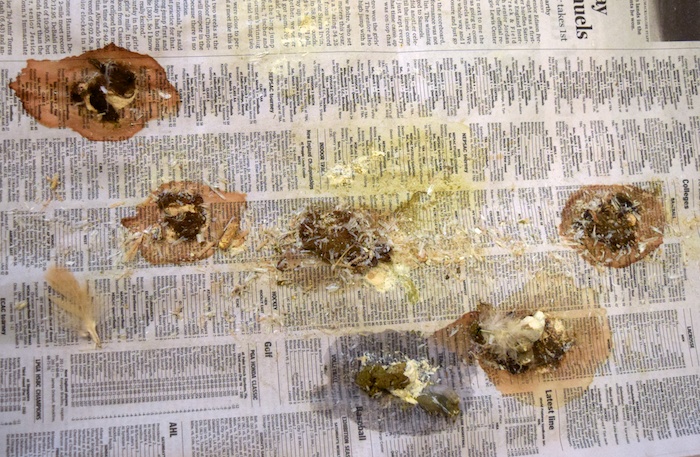

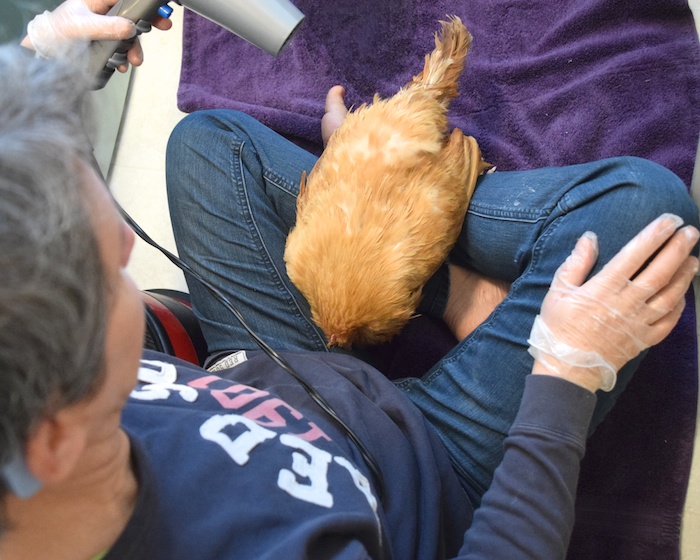
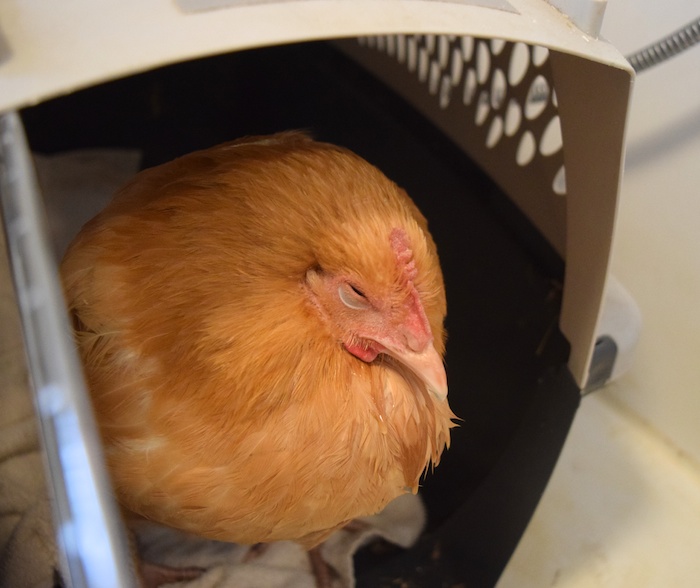
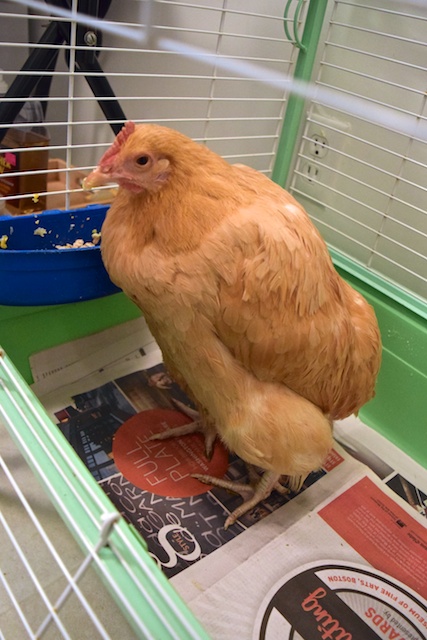
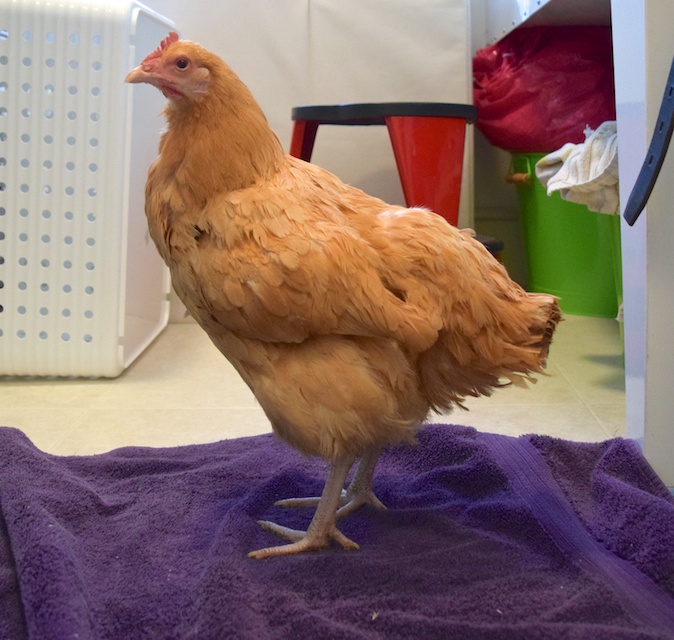
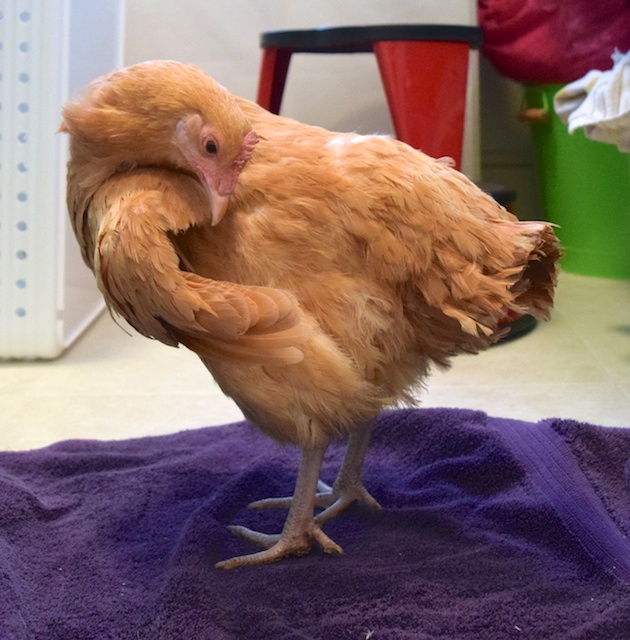
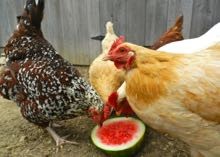
Brilliant work, Terry: she looked so close to death in the early photos that you’ve achieved something really remarkable.
Thank you.
Hi Terry,
I know I must have posted this in the wrong place. I’m sorry Niall.
I live in a tiny town southwest of Boston, Norfolk – do you know it? “The Farmstead Egg Guide & Cookbook” was was on our library’s “featured” shelf, so I went for it. Very informative. I’ve only just started reading, but I see that keeping hens is not done lightly. Many people in town sell their farm fresh eggs and they are a cook’s delight.
I’m watching the hencam right now and it’s delightful. I think the position of the camera makes the hens look curiously Gulliveresque. Great fun – can see you and the goats too.
Sharon
I am always happy to hear that my books are in libraries!
I’m so glad you told the story and posted the photos. Also, that you waited until the period of treatment was over before writing about it.
Um, how does a person get Duramycin? I’d like to have some on hand.
It has a use-by date, so I wouldn’t buy it until needed. It’s available at most feed stores and also on-line.
Wow Terry, you did awesome work as usual! She really did look poorly at the start. Amazing what some TLC does for a girl’s nether regions! Clem looks lovely now.
Yeah! I was wondering if one of the criteria for going back home was her laying an egg? I have used the epsom bath spa treatment here for my Barred rock(thanks to your blog)……as she seems to have a dirty bum, more times then not. I wonder if it has something to do with the HUGE eggs she lays and how long she spends in the nesting box in an effort to pass them? Julie loves her spa treatment too…..she especially seems to love the blow-drying at the end. I will be giving her a treatment soon again now that it is very spring-like here…..lucky girl!
A constantly runny bum can be due to vent gleet – do a blog archive search to read what I do about that.
As far as Clem’s egg laying – I was relieved that she stopped. I actually kept the crate darkened to try to get her to stop. I don’t want her to keep dropping eggs into her abdomen. I won’t be able to save her another time.
Thanks Terry…..I do not feel she has gleet. No runny poos, just sticky globs from time to time. She has a bright red comb and is not bothered by her less than pristine bottom. It is her claim to fame in a flock of fine feathered beauties. :) So are you saying that Clem should not lay any more eggs, ever?
All hens get stickily globs. I ignore them. As far as egg laying for Clem: more about that in my next post.
YES! This is why I read hencam. Thanks a million for sharing. I am anxious to read more about the adventures of Clementine!
You are the best! Chickens and elders so lucky to have you.
What a way to leave us hanging!!! lol I’m SO happy Clem came around! Poor girl just looked pitiful! Can’t wait too hear the next bit of her story!!
Your knowledge for us newbies is so helpful, they are work and need care, unfortunately People think chickens just lay eggs….I am striving for the right to have hens in our yard. been to council meetings….nothing….I have 4, I live in a town that we need 2 acres……4 chicks have fun on 1 acre
Waiting for tomorrow…
Wow what a story. So glad she is on the mend and I too can’t wait for the next part of her story. What good work.
She has been special since the very beginning. Always so friendly. Glad she is on the mend.
Amazing! I’ve read about the penguin stance and wondered if my hen was doing it–nope, there is no mistaking that stance now!
Where do you think the mass went? Could it have been reabsorbed or was it expelled?
Yeah so happy For Clementine! Great story can’t wait to read more
Wow. You did an amazing job! Thank you. Clem would thank you if she could.
Terry, I was just about to write you with the same story for Sugar! Her symptoms were just about the same. I didn’t take her to the vet for a check up as you suggested not to but I almost took her to be euthanized. I keep her inside and bathed her a few times. She would only eat three things; cat food, grapes and chard but she had pellets and water available. I did give olive oil, epsom salt water and probiotic water with a syringe. Now she’s outside with the other girls and standing normal, eating and behaving normal. She can even fly as before she could barely walk. I don’t think she’s cured yet but she’s doing well and eating with gusto. The only thing I didn’t do was give her the antibiotic. I wonder if I still should… Thank you for sharing your story.
That’s awesome Terry!! So glad you were able to save her!! ;)
Terry you are hereby the official Fixer Upper, God bless you in your triumph for helping and knowing the best treatment plan for dear Clementine. And God bless her little chicken soul for being gallant to hang in there!!! Love love your postings!!
Cliffhanger! So glad that you worked your magic on Clementine. She must be channeling Buffy.
Bless you!
What a transformation! I hope she continues to improve. I have read about the ‘penguin’ stance, but never seen it before.
On another note, my Cookbook arrived today. Early night and exciting bedside reading is indicated! Thank you for all your information re chicken keeping. A great resource for us newbies.
I have your cookbook on order and can’t wait for it to arrive.
Amazing recovery! What a special girl!
I have a cochin that has been doing the penguin stance since Christmas Eve. She has a big mass in her abdomen that has gotten bigger. She can’t roost but hangs out with the rest of the flock during the day and otherwise acts normally. At night we bring her in. I spent a ton of money to bring her to the ER but they didn’t really know what was wrong (we do have x rays–they thought maybe an inflamed ovary). We did 20 days of Clavamox but it didn’t really seem to make a difference. She is eatting and pooping normally. She also lays eggs although I try to keep things dark when she comes in because I can’t imagine it is good for her to keep laying. Does Duramycin work differently than Clavamox? We also tried soaks twice (just luke warm water, didn’t try epsom salt) but she seemed stressed and did not like the blow dry so I haven’t wanted to put her through that again. She’s a very friendly girl and easy to work with but has to be handled carefully because the mass is so big. She’s bigger than our other birds and the rest have always looked to her as a mom although they are the same age. Should I try Duramycin? Is the magic of epsom salt worth another attempt at giving her the spa treatment? I’ve felt so helpless watching her mass get bigger while she continues to show her strong will to live and just be a regular chicken.
If she’s integrated into the flock and going about her business, then all has stabilized. More antibiotics won’t do anything to shrink the mass. Likely, if the mass keeps growing, she is still internally laying. You can’t stop that with antibiotics. The only thing that the drug does is to prevent the egg masses from becoming infected. However, we could be totally wrong – it could be cancer. In any event, if she’s functioning, leave her be. If she starts to suffer, I’d euthanize her.
Hi Terry,
I am hoping you can help me. I have been keeping gems for 7 years and have never had a chicken with an impacted crop or sour crop before. However, one of my Barred Rocks most definitely has I believe sour crop as it is more on the squishy side and has been like this the past several days and only this morning did I realize what it was. I gave her some soft bread soaked in olive oil but if it is sour crop I am unsure what to do. I tried searching your blog but didn’t find anything really dealing with treatment on this issue. I have googled it but there seems to be different methods some saying only a vet can help. I have tried in the past to find vets around that treat chickens and have not found any. I trust your advice and hope you can help me to help her. Thank you. ~Meghan